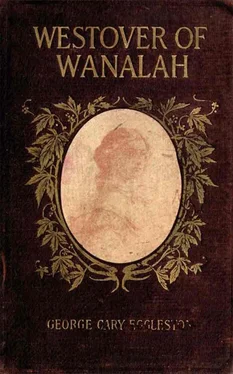George Cary Eggleston - Westover of Wanalah
Здесь есть возможность читать онлайн «George Cary Eggleston - Westover of Wanalah» — ознакомительный отрывок электронной книги совершенно бесплатно, а после прочтения отрывка купить полную версию. В некоторых случаях можно слушать аудио, скачать через торрент в формате fb2 и присутствует краткое содержание. Жанр: unrecognised, на английском языке. Описание произведения, (предисловие) а так же отзывы посетителей доступны на портале библиотеки ЛибКат.
- Название:Westover of Wanalah
- Автор:
- Жанр:
- Год:неизвестен
- ISBN:нет данных
- Рейтинг книги:3 / 5. Голосов: 1
-
Избранное:Добавить в избранное
- Отзывы:
-
Ваша оценка:
- 60
- 1
- 2
- 3
- 4
- 5
Westover of Wanalah: краткое содержание, описание и аннотация
Предлагаем к чтению аннотацию, описание, краткое содержание или предисловие (зависит от того, что написал сам автор книги «Westover of Wanalah»). Если вы не нашли необходимую информацию о книге — напишите в комментариях, мы постараемся отыскать её.
Westover of Wanalah — читать онлайн ознакомительный отрывок
Ниже представлен текст книги, разбитый по страницам. Система сохранения места последней прочитанной страницы, позволяет с удобством читать онлайн бесплатно книгу «Westover of Wanalah», без необходимости каждый раз заново искать на чём Вы остановились. Поставьте закладку, и сможете в любой момент перейти на страницу, на которой закончили чтение.
Интервал:
Закладка:
When the verdict was rendered, the young man turned to his friend and counsellor, and in an entirely unemotional voice, said:
"I thank you sincerely for all you have done and tried to do. I have need of a little time in which to arrange my affairs. Can you do me a final favor by securing it for me?"
The matter was easily arranged. The Judge, full of compassion for the ruined youth, and in spite of reason, testimony, and everything else, still not believing in Boyd Westover's guilt, asked if ten days would suffice. Then without renewing the bail bonds that had expired with the beginning of the trial, he appointed the tenth day thereafter for sentence. It was the Commonwealth's Attorney's business to move for the renewal of the bonds, without which the condemned man was in fact under no restraint whatever, but he made no motion of the kind. When asked by Jack Towns some time afterwards why he had not done his duty in that respect, he replied:
"I simply couldn't. Boyd Westover and I were schoolmates, you know, and I lived for many months in his father's house. I knew he wouldn't run away. Who ever heard of a Westover flinching? Why should I subject him to an indignity?"
Thus, in Virginia, did character—personal and inherited—count. There were some things that a gentleman could not do. He might commit a crime of violence, but he could not do a cowardly or treacherous act. The bailiff who had trusted Boyd Westover's word of honor, knew that and risked the loss of his place upon his confidence in it. The Commonwealth's Attorney knew it and took the chance of impeachment upon it.
The net result was that on the day of his conviction Boyd Westover walked out of court an absolutely free man except in so far as he was bound by his own sense of honor and by the traditions of the race from which he was sprung. These bound him to appear in court for sentence at the end of the ten days allowed to him, and as everybody knew, the bond was amply sufficient.
Jack Towns took him in the meanwhile to his own house.
"You'll be my guest," he said, "and I'll see that we aren't interrupted."
"You still don't mind that?" Boyd asked.
For response he got an earnest look in the eyes, and the verbal answer:
"Don't be a fool, Boyd."
After a minute, Boyd asked, reflectively:
"How is it, Jack, that you and some others seem still to believe in me? In view of the evidence—"
"Hang the evidence," interrupted the lawyer. "Don't you know that character is the most important and the most trustworthy fact in life? You don't suppose for a moment that I have a doubt in your case, do you? If you do, you grievously wrong my friendship."
"How then do you account for the facts as set forth in the testimony against me?"
"What do you mean, Boyd? Are you trying to convince me that you are guilty of a crime that I know to be utterly impossible to you?"
"No. I am only trying to find out the grounds of your confidence in me, so that I may know how far to impose on them in making my arrangements for the future. That's the purport of my question, which, by the way, you haven't answered yet."
"Oh well, as to that, you're the victim of some hideous mistake. If you had let me stave off your trial for six months the chances are we should have found out what the mistake is. As it is—"
"As it is, I couldn't have lived for six months in such suspense as that. Neither could you, in like case. We're the sort of men who say to the lightning, 'Strike if you will, but don't prolong your threats.' Besides, I cannot see how this thing could have been bettered by delay. Those girls honestly believe they recognized me as an intruder in the school. They would believe that quite as firmly six months hence as now."
"Perhaps so. But six months hence not one of them would have been in Virginia to testify against you. Their friends would have taken care of that."
"Yes, I know. And I should have been suspected of securing my acquittal by spiriting away the witnesses against me. I couldn't live under so black a shadow as that."
"I understand. But all this is profitless. We have much to do to get your affairs in order. Let us address ourselves to that. First of all I've had all your mail sent up here from the hotel. Suppose you read it now, and after supper we'll set to work."
CHAPTER VIII – THE SHADOWS FALL
When the shadows begin to fall upon a human life, they fall quickly and darkly.
In Boyd Westover's mail was a letter from the agent who had arranged the mortgage loan upon Wanalah plantation, threatening to abandon the arrangement on the ground that young Westover's conviction impaired the security. This sorely troubled Boyd Westover—for if he was to go to prison his mother's financial ease was a matter of primary concern to him. It didn't trouble Jack Towns in the least.
"Leave that to me for answer," the lawyer said, taking possession of the letter. "The man ought to seek employment as an oyster-opener at Rockett's. That's about his size. That mortgage is completely executed. I've seen to it, pending—other things. That will stand, and, as the property is amply good for it, the fellow's an idiot to want to fly his bargain."
There was news in the next mail that could not be so lightly dismissed. The family physician wrote that Boyd's mother, already in feeble and precarious health, had been shocked by the tidings of her son's calamity into a condition that threatened the worst. This calamity was one which even Boyd Westover's stoicism could not face without flinching. From childhood his affection for his mother had been a dominant passion, and since his father's death it had become fatherly as well as filial. He had jealously guarded that "little mother," as he called her, against every shock, every care, every breath of an adverse wind as it were. He had made a veritable pet of her, and while never for a moment laying aside his chivalric respect and reverence, he had added to them a certain big brotherly manner in which she had found joy untellable. If she wearied while walking with him in the house grounds, he would pick her up, as he might have done with any child, and in spite of her laughing protests, carry her into the porch and deposit her in a hammock. If a light shone disagreeably in her eyes he discovered it and shut it off before she became conscious of its glare. If she went to her room to rest he quietly stationed a maid at the foot of the stairs with orders to permit no noise and no passing up or down.
Now that news came of this dearly loved little mother's serious illness, the young man was made to suffer agonies by the consciousness that her affliction was on his account, so that it required all of Jack Towns's eloquence to convince him that he was himself in nowise to blame for it. By way of emphasizing that, the young lawyer had to put the matter into brutally plain phrase.
"If you were guilty of the crime of which you have been convicted, and for which you will have to serve a term in state's prison, you would do well to scourge your soul with a whip of scorpions for your sin against the mother who bore you. As you are innocent of that and of all other crimes you have no right to hold yourself responsible for the consequences of other people's mistakes."
"Am I free to go to my mother while she yet lives?" Boyd asked in an agony of apprehension.
Then Jack Towns lied—like the generous gentleman he was.
"No," he said. "Legally you are free to go anywhere you please—to Mozambique or the dominions of Mumbo Jumbo if you choose. But you are free only because of the generous confidence of the Judge and the Commonwealth's Attorney in your honor as a gentleman. You are bound by that honor not to leave Richmond during the days granted you."
As a matter of fact Jack Towns had in his possession a letter addressed to him by the Westover family physician in which were written these words:
Читать дальшеИнтервал:
Закладка:
Похожие книги на «Westover of Wanalah»
Представляем Вашему вниманию похожие книги на «Westover of Wanalah» списком для выбора. Мы отобрали схожую по названию и смыслу литературу в надежде предоставить читателям больше вариантов отыскать новые, интересные, ещё непрочитанные произведения.
Обсуждение, отзывы о книге «Westover of Wanalah» и просто собственные мнения читателей. Оставьте ваши комментарии, напишите, что Вы думаете о произведении, его смысле или главных героях. Укажите что конкретно понравилось, а что нет, и почему Вы так считаете.












